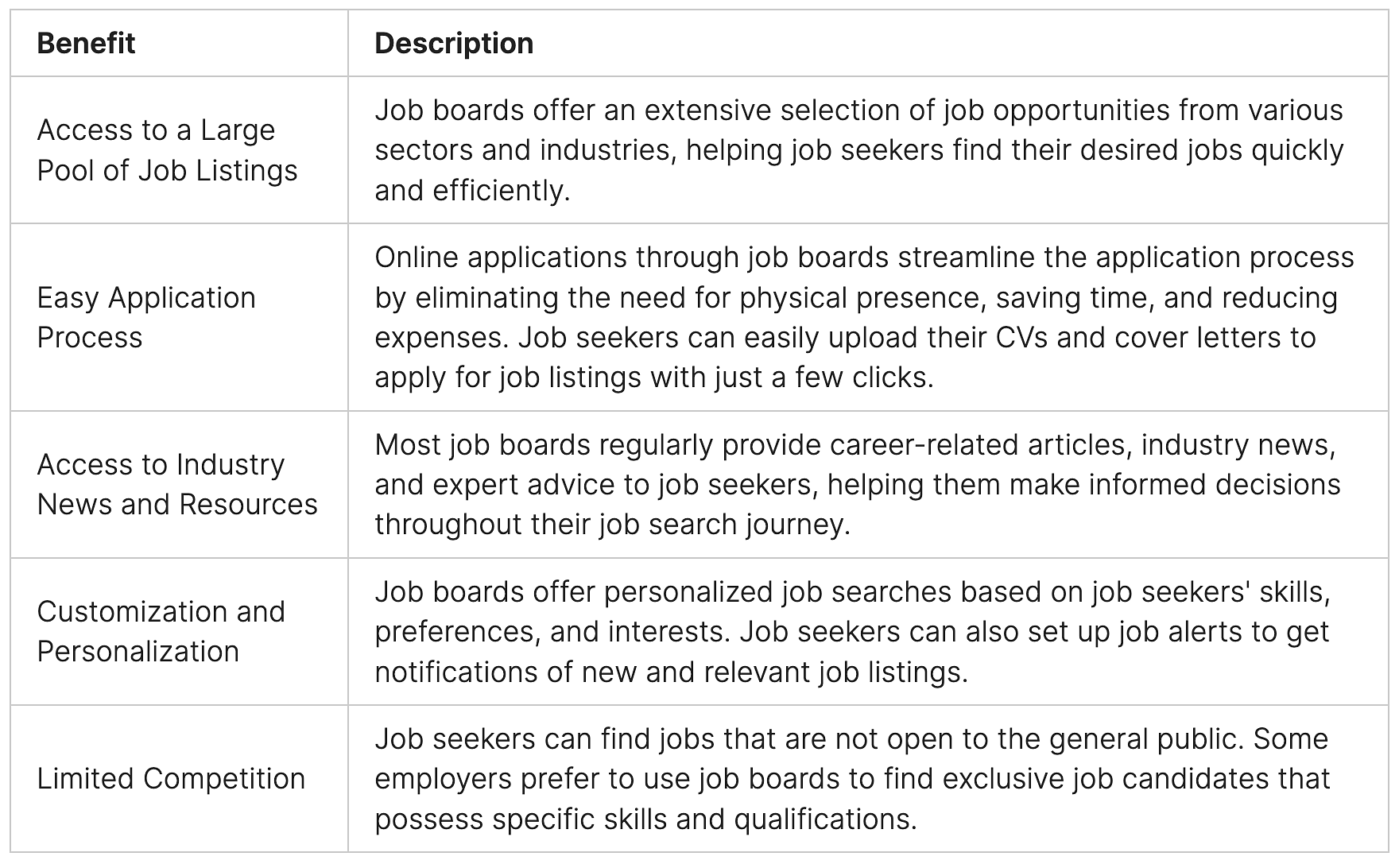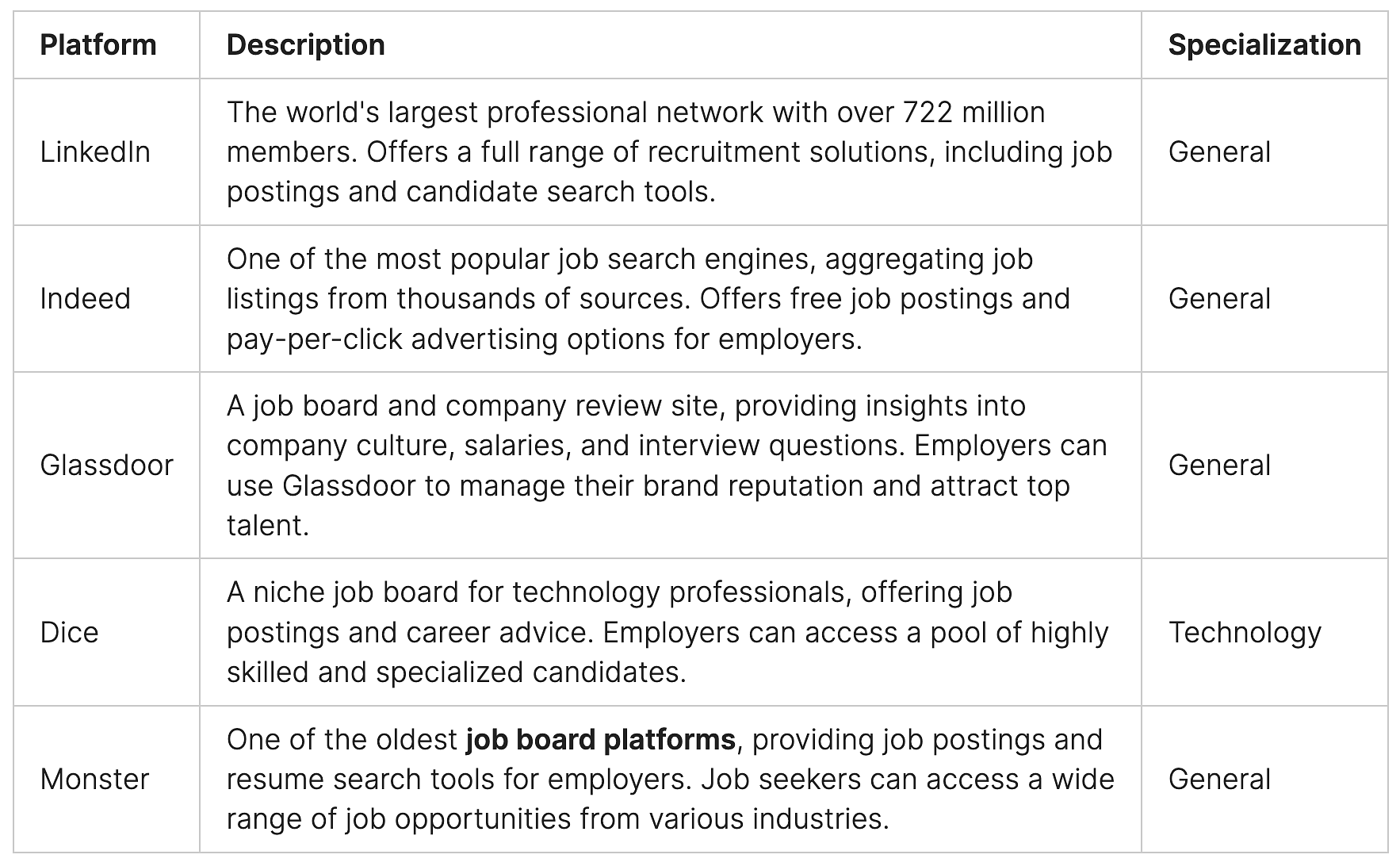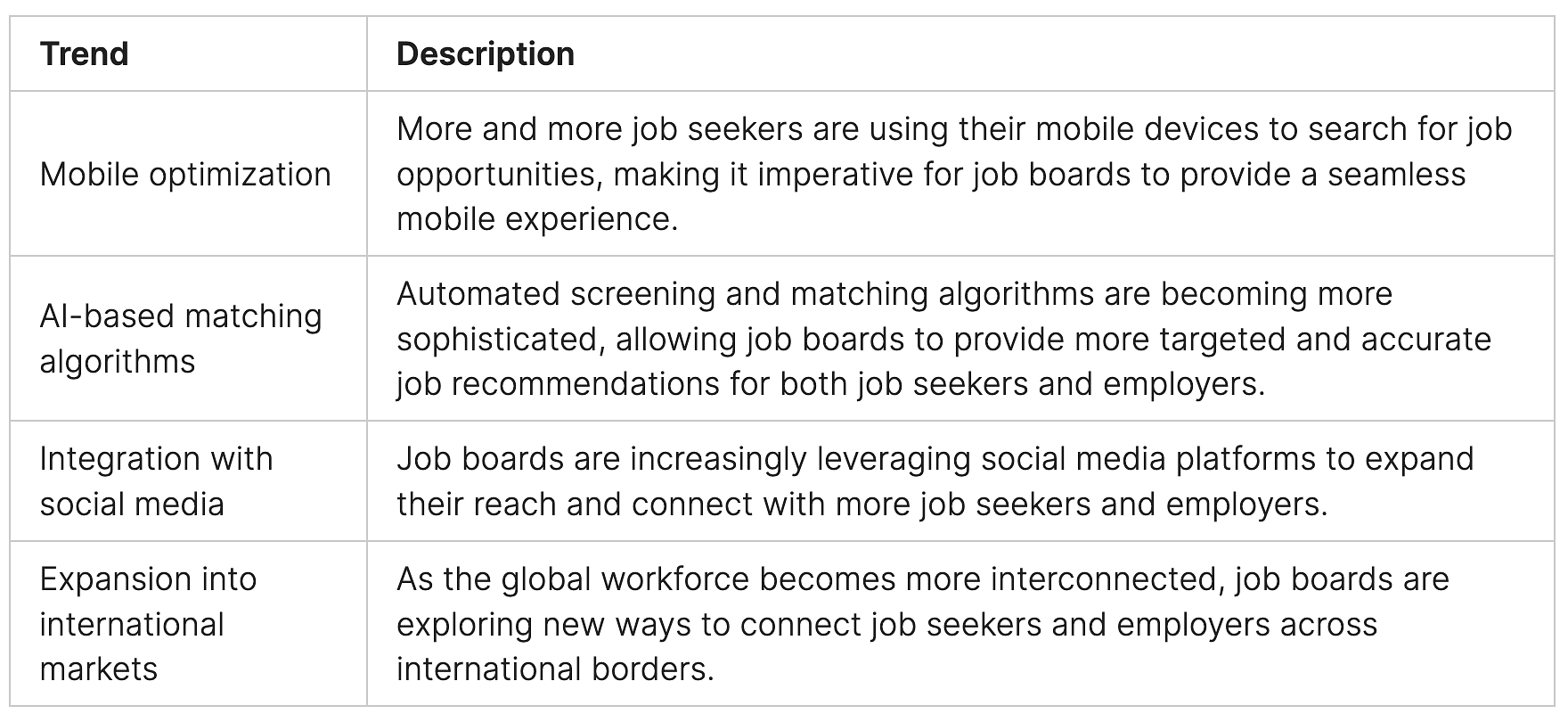What are Job Boards and Why They are Great Businesses
As the job market becomes increasingly competitive, job seekers are seeking more efficient ways to discover job openings and find their ideal careers. At the same time, employers are searching for ways to attract top talent and streamline their hiring process. One solution that has proved to be a win-win for both parties is job boards.
A job board is a digital platform that allows employers to post job openings and job seekers to browse and apply for those opportunities. Job boards have become one of the most popular and effective ways to bridge the gap between job seekers and employers. There are numerous job board websites and specialized job boards, catering to various industries and job types.
Job boards are great businesses because they provide a valuable service to both employers and job seekers, leading to immense user engagement and traffic that can be monetized.
Key Takeaways
- Job boards are digital platforms that connect job seekers with employers.
- Job boards are incredibly popular and effective solutions for the job market.
- Job boards provide a valuable service to users and can be monetized.
Definition of a Job Board
A job board is a website that serves as a centralized platform for employers and job seekers to connect with each other. Job boards allow employers to post job listings and receive applications from interested candidates, and enable job seekers to browse through available job opportunities and apply to them.
Job boards may specialize in specific industries or fields, or cater to a broad range of job categories. They may be operated by independent companies or be part of larger job search websites. Some job boards charge fees for posting job listings or providing advanced features, while others offer free basic services to both employers and job seekers.
Job boards have become popular tools for recruitment in today’s digital landscape, providing a convenient way for employers to reach a large pool of candidates and for job seekers to find suitable job openings. With the ease of online job applications and the increasing competition for quality talent, job boards have become a critical resource for both employers and job seekers alike.
For a deeper dive into job boards, you can explore our complete job board guide to learn how to build, launch, and grow a successful job board.
👉 What is a Job Board
How job boards work
Job boards are online platforms that serve as a meeting point between employers and job seekers. These platforms work by allowing employers to post job openings while also offering job seekers an opportunity to apply to these openings.
In simpler terms, employers use job boards to advertise job positions, whereas job seekers use them to find openings that align with their skills, experience, and interests.
The process of posting a job on a job board is usually straightforward. Employers first create an account, after which they can post job descriptions, salary information, job requirements, and the application process. This information is displayed on the job board for job seekers to browse.
Once job seekers find positions that interest them, they click on the job posting to see more details and determine if they qualify for the position. If a job seeker decides to apply, they will be required to submit their resume, cover letter, and any other necessary details through the platform.
Overall, job boards simplify the process of job searching and recruitment by providing a one-stop-shop for job seekers and employers. By using job boards, employers increase the visibility of their job openings, while job seekers have access to a wide variety of job opportunities, providing the best fit for their skills and preferences.
Benefits for Job Seekers
Job boards are a valuable resource for job seekers, providing a wide range of benefits that simplify the job search process and increase the chances of finding the right job. Some of the key advantages job seekers can gain from using job boards include:

In summary, job boards offer job seekers a wealth of benefits, from easy applications and personalized job searches to industry resources and limited competition for job openings. As such, job seekers can leverage these advantages to increase their chances of finding the right job role.
Benefits for Employers
Job boards offer employers numerous benefits that help streamline the recruitment process and reach potential candidates more efficiently. One of the main advantages is the ability to post job listings to a large pool of qualified candidates, increasing the chances of finding the right fit for the position.
Employers can also use job boards to manage applicants, track their progress and communicate with them through the platform. This creates a streamlined and organized system that simplifies the hiring process and reduces the burden on HR departments.
Another significant benefit is the cost-effectiveness of job boards compared to traditional recruitment methods. By using job boards, employers can save on expenses associated with advertising and recruiting, while still accessing a wide range of applicants.
Example Table: Cost Comparison of Job Boards vs Traditional Recruitment Methods

Overall, job boards provide a convenient and cost-effective solution for employers to find the right talent and make the recruitment process more manageable and efficient.
Monetization Models for Job Boards
Job boards have become a lucrative business model due to the increase in job seekers and employers turning to online platforms to find the right talent or job. Here are three common monetization models job boards utilize to generate revenue:
Subscription fees:
Some job boards require job seekers and employers to pay a monthly or annual subscription fee to access their premium features. By offering advanced search filters, personalized alerts, or data analytics, job boards can differentiate themselves from competitors and provide extra value to users. Examples of job boards that use this model include LinkedIn Premium Career, CareerBuilder, and Monster.
Sponsored job postings:
Many job boards allow employers to sponsor specific job postings to increase visibility to potential candidates. Sponsored postings are usually featured at the top of search results or highlighted in some way. Job boards can charge employers an additional fee for this service, providing a win-win solution for both parties. Examples of job boards that use this model include Glassdoor, Indeed, and ZipRecruiter.
Advertising:
Job boards can monetize their platform by selling advertising space to third-party companies. Employers or recruiters can display their brand’s ads on the job board website to improve brand awareness and attract more relevant candidates. Job boards can charge a fee for various advertising methods, such as display ads, banner ads, or sponsored content. Examples of job boards that use this model include SimplyHired, Dice, and FlexJobs.
By leveraging one or a combination of these monetization models, job board businesses can successfully generate revenue while providing valuable services to job seekers and employers.
Popular Job Board Platforms
Job board platforms have become increasingly popular in recent years, providing job seekers with an easy and accessible way to find employment opportunities, while giving employers a simple and effective method for recruiting new talent. Below are some of the best job board platforms that have gained prominence in the market:

These popular job board platforms have established themselves as trusted resources for both job seekers and employers, providing a wide range of tools and services to facilitate the recruitment process.
Tips for Starting a Successful Job Board Business
If you’re considering starting a job board business, there are several key insights and tips to keep in mind to ensure success.
Conduct thorough market research
Before diving headfirst into your job board venture, it’s essential to conduct thorough market research. Analyze your competition, identify areas of need and opportunity, and define your target audience. Understanding the current job market trends and using this information to tailor your job board accordingly can help set you apart in a crowded field. Pick a niche that isn’t too crowded – Sometimes less is more. Remember, “the riches are in the niches”.
Focus on user experience
Your job board’s user experience will be a crucial factor in its success. Make sure your site is easy to navigate, with clear and concise job postings and application instructions. Streamline the job search and application processes and ensure your site is accessible from desktop and mobile devices.
Implement effective marketing strategies
Launching a job board is just the first step. Getting the word out to potential users and employers is essential to attract traffic and grow your business. Utilize social media, SEO, email marketing, and other tactics to promote your site and attract candidates and companies to your platform.
Monetization strategies
Identify and plan your monetization strategies from the beginning. Consider offering subscription plans or charging a fee for premium job listings. Implementing advertising or sponsored content can also help generate revenue. Finding the right balance between monetization and user experience is critical to maximize profitability and growth.
Build a loyal user community
A strong, engaged user community can help drive traffic to your site through referrals and word-of-mouth marketing. Encourage interactivity between users, such as job seeker forums, and offer special promotions or rewards to loyal users who refer others to your site. A newsletter can also be a great add-on to a job board, this promotes engagement and community.
By keeping these tips in mind, you can increase your chances of starting a successful job board business and establishing your platform as a go-to resource for job seekers and employers alike.
Future Trends in the Job Board Industry
The job board industry has undergone rapid changes in recent years, driven by advancements in technology and shifting preferences among job seekers and employers. Here are some of the future trends that industry experts predict:

Overall, the future looks bright for job board businesses that stay ahead of the curve and adopt new technologies and strategies to better serve the needs of job seekers and employers.
Final thoughts
Job boards have revolutionized the job hunting and recruitment process, providing a platform for job seekers and employers to connect efficiently and effectively. With the digital landscape constantly evolving, the job board industry shows no signs of slowing down, offering vast potential for entrepreneurs looking to start a successful business.
By providing numerous benefits to both job seekers and employers, including increased access to job opportunities and streamlined recruitment processes, job boards have become integral tools in today’s job market. In addition to this, monetization models such as subscription fees, sponsored job postings, and advertising offer revenue-generating opportunities for job board businesses.
Entrepreneurs looking to start a job board business should prioritize research, user experience, and marketing strategies to ensure success in a highly competitive market. Additionally, with the future trends in the job board industry including mobile optimization and AI-based matching algorithms, it is crucial to stay up-to-date with emerging technologies and adapt accordingly.
In conclusion, job boards are great businesses that offer numerous benefits to job seekers and employers alike. Starting a job board business can be a rewarding venture in today’s digital landscape, with evolving trends providing ample opportunities for growth. As the job board industry continues to expand and evolve, the potential for success is unlimited.
FAQ
What are job boards?
A job board is an online platform that connects job seekers with employers by allowing companies to post job openings and individuals to search and apply for relevant opportunities.
Why are job boards great businesses?
Job boards are great businesses because they offer a valuable service to both job seekers and employers. They provide a centralized hub for job postings, making it easier for companies to find qualified candidates and for individuals to discover job opportunities.
How do job boards work?
Job boards work by allowing employers to post job listings with details about the position, requirements, and application instructions. Job seekers can search for suitable jobs based on their preferences and skills and apply directly through the job board platform.
What are the benefits of job boards for job seekers?
Job boards offer several benefits for job seekers. They provide access to a wide range of job opportunities from various industries and locations. Job seekers can easily search and filter positions based on their preferences and conveniently apply online.
What are the benefits of job boards for employers?
Job boards offer numerous benefits for employers. They provide a platform to reach a large pool of potential candidates and streamline the recruitment process by allowing companies to manage applications, screen resumes, and communicate with applicants efficiently.
How do job boards generate revenue?
Job boards employ various monetization models to generate revenue. Common methods include charging employers a fee to post job listings, offering premium features or services for additional fees, and displaying targeted advertisements on the platform.
Which are some popular job board platforms?
There are several popular job board platforms in the market, catering to both general and niche-specific industries. Examples include Indeed, LinkedIn, Monster, Glassdoor, and CareerBuilder.
What tips can help start a successful job board business?
To start a successful job board business, it is essential to conduct thorough market research to identify target audiences and competitors. Focusing on user experience, creating a user-friendly interface, and implementing effective marketing strategies are key to attracting both job seekers and employers.
What are the future trends in the job board industry?
The job board industry is continuously evolving. Some future trends include the increasing importance of mobile optimization to cater to mobile job seekers, the integration of artificial intelligence algorithms to enhance job matching, and the adoption of advanced data analytics to provide insightful job market trends and talent acquisition strategies.
